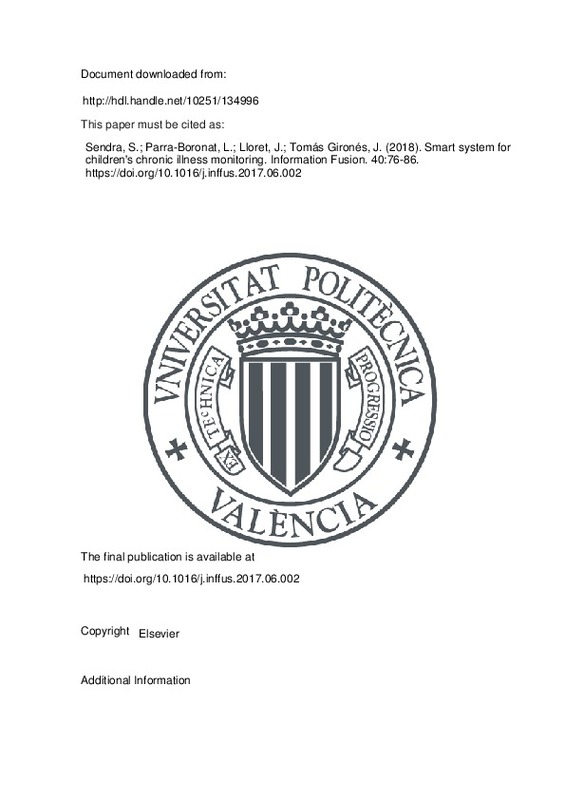JavaScript is disabled for your browser. Some features of this site may not work without it.
Buscar en RiuNet
Listar
Mi cuenta
Estadísticas
Ayuda RiuNet
Admin. UPV
Smart system for children's chronic illness monitoring
Mostrar el registro sencillo del ítem
Ficheros en el ítem
| dc.contributor.author | Sendra, Sandra
|
es_ES |
| dc.contributor.author | Parra-Boronat, Lorena
|
es_ES |
| dc.contributor.author | Lloret, Jaime
|
es_ES |
| dc.contributor.author | Tomás Gironés, Jesús
|
es_ES |
| dc.date.accessioned | 2020-01-17T21:02:07Z | |
| dc.date.available | 2020-01-17T21:02:07Z | |
| dc.date.issued | 2018 | es_ES |
| dc.identifier.issn | 1566-2535 | es_ES |
| dc.identifier.uri | http://hdl.handle.net/10251/134996 | |
| dc.description.abstract | [EN] Sick children need a continuous monitoring, but this involves high costs for the government and for the parents. The use of information and communication technologies (ICT) jointly with artificial intelligence and smart devices can reduce these costs, help the children and assist their parents. This paper presents a smart architecture for children's chronic illness monitoring that will let the caregivers (parents, teachers and doctors) to remotely monitor the health of the children based on the sensors embedded in the smartphones and smart wearable devices. The proposed architecture includes a smart algorithm developed to intelligently detect if a parameter has exceeded a threshold, thus it may imply an emergency or not. To check the correct operation of this system, we have developed a small wearable device that is able to measure the heart rate and the body temperature. We have designed a secure mechanism to stablish a Bluetooth connection with the smartphone. In addition, the system is able to perform the data fusion in both the information packetizing process, which contributes to improve the protocol performance, and in the measured values combination, where it is used a stochastic approach. As a result, our system can fusion data from different sensors in real-time and detect automatically strange situations for sending a warning to the caregivers. Finally, the consumed bandwidth and battery autonomy of the developed device have been measured. | es_ES |
| dc.description.sponsorship | This work has been partially supported by the "Ministerio de EducaciOn, Cultura y Deporte", through the "Ayudas para contratos predoctorales de Formacion del Profesorado Universitario FPU (Convocatoria 2014)". Grant number FPU14/02953. | es_ES |
| dc.language | Inglés | es_ES |
| dc.publisher | Elsevier | es_ES |
| dc.relation.ispartof | Information Fusion | es_ES |
| dc.rights | Reserva de todos los derechos | es_ES |
| dc.subject | Smart algorithm | es_ES |
| dc.subject | Chronic diseases | es_ES |
| dc.subject | Child monitoring | es_ES |
| dc.subject | EHealth | es_ES |
| dc.subject | Wearable devices | es_ES |
| dc.subject.classification | INGENIERIA TELEMATICA | es_ES |
| dc.title | Smart system for children's chronic illness monitoring | es_ES |
| dc.type | Artículo | es_ES |
| dc.identifier.doi | 10.1016/j.inffus.2017.06.002 | es_ES |
| dc.relation.projectID | info:eu-repo/grantAgreement/MECD//FPU2014-02953/ES/FPU2014-02953/ | es_ES |
| dc.rights.accessRights | Abierto | es_ES |
| dc.contributor.affiliation | Universitat Politècnica de València. Departamento de Comunicaciones - Departament de Comunicacions | es_ES |
| dc.contributor.affiliation | Universitat Politècnica de València. Instituto de Investigación para la Gestión Integral de Zonas Costeras - Institut d'Investigació per a la Gestió Integral de Zones Costaneres | es_ES |
| dc.description.bibliographicCitation | Sendra, S.; Parra-Boronat, L.; Lloret, J.; Tomás Gironés, J. (2018). Smart system for children's chronic illness monitoring. Information Fusion. 40:76-86. https://doi.org/10.1016/j.inffus.2017.06.002 | es_ES |
| dc.description.accrualMethod | S | es_ES |
| dc.relation.publisherversion | https://doi.org/10.1016/j.inffus.2017.06.002 | es_ES |
| dc.description.upvformatpinicio | 76 | es_ES |
| dc.description.upvformatpfin | 86 | es_ES |
| dc.type.version | info:eu-repo/semantics/publishedVersion | es_ES |
| dc.description.volume | 40 | es_ES |
| dc.relation.pasarela | S\376414 | es_ES |
| dc.contributor.funder | Ministerio de Educación, Cultura y Deporte | es_ES |







![[Cerrado]](/themes/UPV/images/candado.png)

